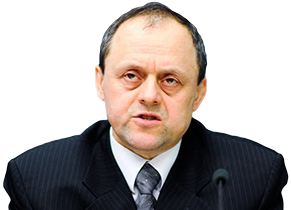Deployment of the OSCE’s armed police mission in Donbas as early as 2017 is actually possible. The current visit of Foreign Minister of Ukraine Pavlo Klimkin and head of the OSCE Sebastian Kurz to Donbas will undoubtedly contribute to the implementation of this idea. After all, for us to get sympathy and support from the new OSCE leadership, this leadership should understand the situation on the ground. As far as it doesn’t see what is really happening in eastern Ukraine, it is rather difficult to expect it to promote the move.
I believe that the joint trip by Klimkin and Kurz opens possibilities for achieving such understanding on the part of the international staff of the OSCE in order for them to pass it on to others. I should remind that the OSCE not only includes European and Eurasian states, but also the U.S. and Canada...
Personally, I support the idea of placing the mission in Donbas. We’ll see whether it will be a monitoring mission or an armed one, whether it will be a mission aimed to separate warring parties with a mandate similar to that of the UN peacekeeping missions. The functions of the mission will finally be clear when the OSCE Council approves its mandate. It will determine what forces and means, and from which countries, can be involved. As far as I understand, it may be a copy of the UN missions - when it comes to monitoring (this function is performed almost by all missions), separating the warring parties at certain distance and placing between them of patrol routes or checkpoints, or something of this kind...
The ultimate mandate this mission is yet to be determined. But, in any case, even if the mission is able to achieve one goal – separating the two sides by a distance that will not allow them to open fire, that is, if a ceasefire is finally in place, is it will already be a great outcome, and this fills the idea of OSCE mission’s deployment in Donbas with a clear sense.
However, it should be understood that the final decision on the success or failure of such mission depends on a single person - President of Russia Vladimir Putin
The way the sides are to be separated along the contact line to achieve ceasefire will be determined in negotiations. Perhaps, these talks will also set sanctions against those failing to implement the agreements. And this will constitute the difference with what is happening today. For now, the parties simply try to reach some kind of an agreement, and if someone violates them, there can as well be no punishment for that whatsoever.
However, it should be understood that the final decision on the success or failure of such mission depends on a single person - President of Russia Vladimir Putin. If at some point he decides (whether personally, or under pressure) that the deployment of the OSCE mission in Donbas plays in his hands, then such mission will be deployed. If not, then this mission is not to be expected anytime soon. Maybe, sometime in the future, or even never.
It should be noted that after 2014-2015, when Russia realized that large-scale fighting is not in its interests, it shifted to subversive activities in the territory of Ukraine: sabotage, political destructive interference, provocation via agents of influence, information warfare, cyberattacks, and so on. This is a whole system of efforts. Russia hopes that, as long as it cannot quickly achieve its goals, it would be able to achieve them slower, through certain efforts, which will force the Ukrainian people to lose trust in its leadership, get into internal squabbles and once again choose someone like Viktor Yanukovych...
Therefore, Russia’s consent to the deployment of the OSCE mission could also mean that major efforts are transferred from subversion to some more long-term moves or a compromise. If the sides reach a compromise, it may indicate that through such consent to the deployment of the mission, Putin tries to save his face.
So, both the Ukrainian leadership and the public must realize the risks that arise. For example, the risks of the Crimea issue being pushed "beyond" the deal or the risks of Ukraine facing the burden of Donbas recovery and solving political problems, and so on. That is, the consent of the Kremlin to the deployment of such mission can contribute to Russia’s subversive efforts in Ukraine.
Therefore, Russia’s consent to the deployment of the OSCE mission could also mean that major efforts are transferred from subversion to some more long-term moves or a compromise
However, we should also be aware that this very mission allows moving the situation from a deadlock of a temporary balance (if it’s not moved, this delicate balance could last for a long time because Russia can as well not fall apart that soon). So, the issue involves some risks for Ukraine, which are highlighted above. And, at the same time, it could open new opportunities.
What will prevail - new opportunities or risks? Everything is in our hands and in the hands of our allies.
Leonid Polyakov is a military expert and former Deputy Defense Minister of Ukraine


